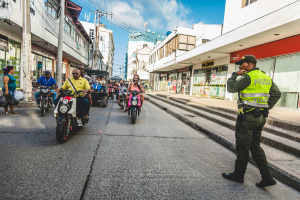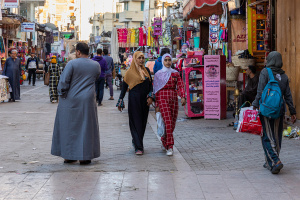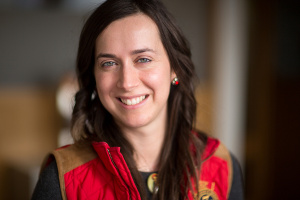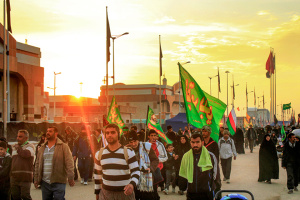
Fotini Christia
Ford International Professor of the Social Sciences
Director, MIT Institute for Data, Systems, and Society
Director, MIT Sociotechnical Systems Research Center (SSRC)
Civil wars; political violence; identity politics; post-conflict reconstruction; field experiments; big data; Middle East.
Biography
Fotini Christia is the Ford International Professor of the Social Sciences in the Department of Political Science at the Massachusetts Institute of Technology. She is Director of the Sociotechnical Systems Research Center (SSRC), Associate Director of the Institute for Data, Systems, and Society (IDSS), and Chair of the doctoral program in Social and Engineering Systems (SES) at MIT's Schwarzman College of Computing. Her research had focused on issues of conflict and cooperation in the Muslim world, and she has conducted fieldwork in Afghanistan, Bosnia, Iraq, Iran, the Palestinian Territories, Syria, and Yemen. She is currently working to bridge the social sciences, data science, and computation by bringing researchers from these disciplines together to address systemic racism across housing, healthcare, policing, and social media. She also has a new line of research that examines how to effectively integrate AI tools in public policy.
Fotini is the author of “Alliance Formation in Civil War” (Cambridge University Press, 2012), which was awarded the Luebbert Award for Best Book in Comparative Politics, the Lepgold Prize for Best Book in International Relations, and a Distinguished Book Award from the International Studies Association. She is co-editor with Graeme Blair (UCLA) and Jeremy Weinstein (Stanford) of "Crime, Insecurity, and Community Policing: Experiments on Building Trust", forthcoming with Cambridge University Press (2024). Her research has also appeared in Science, Nature Human Behavior, Review of Economic Studies, NeurIPs, Communications Medicine, IEEE Transactions on Network Science and Engineering, American Political Science Review, and Annual Review of Political Science among other journals. Her opinion pieces have been published in Foreign Affairs, The New York Times, The Washington Post, and The Boston Globe among other outlets. Fotini graduated magna cum laude from Columbia University in 2001 with a joint BA in Economics–Operations Research and an MA in International Affairs. She joined the MIT faculty in July 2008 after receiving her PhD in Public Policy from Harvard University that year.
Research
Fotini has done extensive big data, experimental, survey, and ethnographic fieldwork on ethnicity, conflict, and development in divided societies in the Muslim world. She has completed impact evaluations of an experimental design on the largest community driven development program in Afghanistan and on school integration in Bosnia-Herzegovina. She has done survey and experimental research on religion and sectarianism in Iraq and worked with Cellphone Data Records from Yemen and Turkey, exploring drone strikes and migration in the former and Syrian refugee integration in the latter. She has also worked with image and text social media data across platforms exploring implications for violence and gender-based violence in Syria and Egypt. She is now actively engaged on new projects around integrating AI for social good in the context of health, policing, as well as cultural preservation.
Fotini is the author of Alliance Formation in Civil War, published by Cambridge University Press in 2012, which received the Luebbert Award for Best Book in Comparative Politics, the Lepgold Prize for Best Book in International Relations and the Distinguished Book Award of the Ethnicity, Nationalism, and Migration Section of the International Studies Association. She is also co-editor with Graeme Blair (UCLA) and Jeremy Weinstein (Stanford) of "Crime, Insecurity, and Community Policing: Experiments on Building Trust", forthcoming with Cambridge University Press in September 2024. Fotini was also an inaugural Andrew Carnegie Fellow and a Harvard Academy Fellow. Her articles have appeared in Science, Nature Human Behavior, AAAI, NeurIPS, Communications Medicine, IEEE Transactions on Network Science and Engineering, Review of Economic Studies, American Economic Journal: Applied Economics, Journal of Development Economics, American Political Science Review, Annual Review of Political Science, Journal of Politics and Comparative Politics, among other journals. For her research, Fotini has received support from MURI and DARPA grants, as well as from Google, the International Growth Center, the Russell Sage Foundation, USAID, CIDA, the UN, and the World Bank among others.
Recent Publications
"Can Development Programs Counter Insurgencies? Evidence from a Field Experiment in Afghanistan." forthcoming in the American Economic Journal: Applied Economics (With Andrew Beath and Ruben Enikolopov).
"Empowering women facing gender-based violence amid COVID-19 through media campaigns", Nat Hum Behav (2023). (With Horacio Larreguy, Manuel Quintero and Elizabeth Parker-Magyar).
"Mitigating the Impact of Biased Artificial Intelligence in Emergency Decision-Making," Communications Medicine, 2022. (With Hammaad Adam, Emily Alsentzer, Aparna Balagopalan and Marzyeh Ghassemi).
"Evidence on the nature of sectarian animosity from a geographically representative survey of Iraqi and Iranian Shia pilgrims." Nat Hum Behavior, 2022 Sep;6(9):1226-1233. (With Elizabeth Dekeyser and Dean Knox).
“Community Policing Does not Build Trust in Police or Reduce Crime in the Global South”, Science 374, 1098 (2021). (With Graeme Blair, Jeremy Weinstein, Eric Arias, Emile Bardan, Robert A. Blair, Ali Cheema, Ahsan Farooqui, Thiemo Fetzer, Guy Grossman, Dotan Haim, Zulfiqar Hameed, Rebecca Hanson, Ali Hasanain, Dorothy Kronick, Benjamin Morse, Robert Muggah, Fatiq Nadeem, Lily Tsai, Matthew Nanes, Tara Slough, Nico Ravanilla, Jacob N. Shapiro, Barbara Silva, Pedro L. Souza, Anna Wilke).
“Scalable Equilibrium Computation in Multi-agent Influence Games on Networks,” in Proceedings of the 35th AAAI Conference on Artificial Intelligence (AAAI-21). (With Michael Curry, Constantinos Daskalakis, Erik Demaine, John P. Dickerson, Mohammad Taghi Hajiaghayi, Adam Hesterberg, Marina Knittel, and Aidan Milliff).
Teaching
| 17.582 | Civil War |
| 17.511 | Critical Perspectives on Data and Identity |
| 17.869 | Scope and Methods |
News
Biography
Fotini Christia is the Ford International Professor of the Social Sciences in the Department of Political Science at the Massachusetts Institute of Technology. She is Director of the Sociotechnical Systems Research Center (SSRC), Associate Director of the Institute for Data, Systems, and Society (IDSS), and Chair of the doctoral program in Social and Engineering Systems (SES) at MIT's Schwarzman College of Computing. Her research had focused on issues of conflict and cooperation in the Muslim world, and she has conducted fieldwork in Afghanistan, Bosnia, Iraq, Iran, the Palestinian Territories, Syria, and Yemen. She is currently working to bridge the social sciences, data science, and computation by bringing researchers from these disciplines together to address systemic racism across housing, healthcare, policing, and social media. She also has a new line of research that examines how to effectively integrate AI tools in public policy.
Fotini is the author of “Alliance Formation in Civil War” (Cambridge University Press, 2012), which was awarded the Luebbert Award for Best Book in Comparative Politics, the Lepgold Prize for Best Book in International Relations, and a Distinguished Book Award from the International Studies Association. She is co-editor with Graeme Blair (UCLA) and Jeremy Weinstein (Stanford) of "Crime, Insecurity, and Community Policing: Experiments on Building Trust", forthcoming with Cambridge University Press (2024). Her research has also appeared in Science, Nature Human Behavior, Review of Economic Studies, NeurIPs, Communications Medicine, IEEE Transactions on Network Science and Engineering, American Political Science Review, and Annual Review of Political Science among other journals. Her opinion pieces have been published in Foreign Affairs, The New York Times, The Washington Post, and The Boston Globe among other outlets. Fotini graduated magna cum laude from Columbia University in 2001 with a joint BA in Economics–Operations Research and an MA in International Affairs. She joined the MIT faculty in July 2008 after receiving her PhD in Public Policy from Harvard University that year.
Research
Fotini has done extensive big data, experimental, survey, and ethnographic fieldwork on ethnicity, conflict, and development in divided societies in the Muslim world. She has completed impact evaluations of an experimental design on the largest community driven development program in Afghanistan and on school integration in Bosnia-Herzegovina. She has done survey and experimental research on religion and sectarianism in Iraq and worked with Cellphone Data Records from Yemen and Turkey, exploring drone strikes and migration in the former and Syrian refugee integration in the latter. She has also worked with image and text social media data across platforms exploring implications for violence and gender-based violence in Syria and Egypt. She is now actively engaged on new projects around integrating AI for social good in the context of health, policing, as well as cultural preservation.
Fotini is the author of Alliance Formation in Civil War, published by Cambridge University Press in 2012, which received the Luebbert Award for Best Book in Comparative Politics, the Lepgold Prize for Best Book in International Relations and the Distinguished Book Award of the Ethnicity, Nationalism, and Migration Section of the International Studies Association. She is also co-editor with Graeme Blair (UCLA) and Jeremy Weinstein (Stanford) of "Crime, Insecurity, and Community Policing: Experiments on Building Trust", forthcoming with Cambridge University Press in September 2024. Fotini was also an inaugural Andrew Carnegie Fellow and a Harvard Academy Fellow. Her articles have appeared in Science, Nature Human Behavior, AAAI, NeurIPS, Communications Medicine, IEEE Transactions on Network Science and Engineering, Review of Economic Studies, American Economic Journal: Applied Economics, Journal of Development Economics, American Political Science Review, Annual Review of Political Science, Journal of Politics and Comparative Politics, among other journals. For her research, Fotini has received support from MURI and DARPA grants, as well as from Google, the International Growth Center, the Russell Sage Foundation, USAID, CIDA, the UN, and the World Bank among others.
Recent Publications
"Can Development Programs Counter Insurgencies? Evidence from a Field Experiment in Afghanistan." forthcoming in the American Economic Journal: Applied Economics (With Andrew Beath and Ruben Enikolopov).
"Empowering women facing gender-based violence amid COVID-19 through media campaigns", Nat Hum Behav (2023). (With Horacio Larreguy, Manuel Quintero and Elizabeth Parker-Magyar).
"Mitigating the Impact of Biased Artificial Intelligence in Emergency Decision-Making," Communications Medicine, 2022. (With Hammaad Adam, Emily Alsentzer, Aparna Balagopalan and Marzyeh Ghassemi).
"Evidence on the nature of sectarian animosity from a geographically representative survey of Iraqi and Iranian Shia pilgrims." Nat Hum Behavior, 2022 Sep;6(9):1226-1233. (With Elizabeth Dekeyser and Dean Knox).
“Community Policing Does not Build Trust in Police or Reduce Crime in the Global South”, Science 374, 1098 (2021). (With Graeme Blair, Jeremy Weinstein, Eric Arias, Emile Bardan, Robert A. Blair, Ali Cheema, Ahsan Farooqui, Thiemo Fetzer, Guy Grossman, Dotan Haim, Zulfiqar Hameed, Rebecca Hanson, Ali Hasanain, Dorothy Kronick, Benjamin Morse, Robert Muggah, Fatiq Nadeem, Lily Tsai, Matthew Nanes, Tara Slough, Nico Ravanilla, Jacob N. Shapiro, Barbara Silva, Pedro L. Souza, Anna Wilke).
“Scalable Equilibrium Computation in Multi-agent Influence Games on Networks,” in Proceedings of the 35th AAAI Conference on Artificial Intelligence (AAAI-21). (With Michael Curry, Constantinos Daskalakis, Erik Demaine, John P. Dickerson, Mohammad Taghi Hajiaghayi, Adam Hesterberg, Marina Knittel, and Aidan Milliff).
Teaching
| 17.582 | Civil War |
| 17.511 | Critical Perspectives on Data and Identity |
| 17.869 | Scope and Methods |






